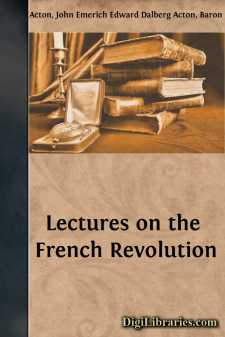History
- Africa 30
- Americas (North Central South West Indies) 50
- Ancient 68
- Asia 58
- Australia & New Zealand 8
- Canada 41
- Caribbean & West Indies 1
- Civilization 20
- Eastern Europe 12
- Europe 310
- Expeditions & Discoveries 60
- General 77
- Historical Geography 1
- Jewish 9
- Latin America 3
- Medieval 8
- Middle East 14
- Military 248
- Revolutionary 8
- Study & Teaching 5
- United States 353
- Western Europe 56
- World 13
History Books
Sort by:
I Had you been in Paris late in the afternoon of Monday, August third, nineteen fourteen, you might have seen a slight man, whose reddish face was adorned with a thick white mustache, walk out of the German Embassy, which was situated on the Rue de Lille near the Boulevard St. Germain. Along the boulevard and across the Pont de la Concorde he walked in a manner calculated to attract attention. He...
more...
WALDEN Economy When I wrote the following pages, or rather the bulk of them, I lived alone, in the woods, a mile from any neighbor, in a house which I had built myself, on the shore of Walden Pond, in Concord, Massachusetts, and earned my living by the labor of my hands only. I lived there two years and two months. At present I am a sojourner in civilized life again. I should not obtrude my affairs so...
more...
by:
Julian Hawthorne
INTRODUCTION When we speak of History, we may mean either one of several things. A savage will make picture-marks on a stone or a bone or a bit of wood; they serve to recall to him and his companions certain events which appeared remarkable or important for one or another reason; there was an earthquake, or a battle, or a famine, or an invasion: the chronicler himself, or some fellow-tribesman of his,...
more...
THE HERALDS OF THE REVOLUTION The revenue of France was near twenty millions when Lewis XVI., finding it inadequate, called upon the nation for supply. In a single lifetime it rose to far more than one hundred millions, while the national income grew still more rapidly; and this increase was wrought by a class to whom the ancient monarchy denied its best rewards, and whom it deprived of power in the...
more...
Events move so quickly at this time, that it is hard to set them down from memory even in chronological sequence. Neither newspapers nor documents are at our disposal. And vet the repeated interruptions in the Brest-Litovsk negotiations create a suspense which, under present circumstances, is no longer bearable. I shall endeavor, therefore, to recall the course and the landmarks of the October...
more...
by:
Arnold Bennett
THE FIRST NIGHT I sat with a melting ice on my plate, and my gaze on a very distant swinging door, through which came and went every figure except the familiar figure I desired. The figure of a woman came. She wore a pale-blue dress and a white apron and cap, and carried a dish in uplifted hands, with the gesture of an acolyte. On the bib of the apron were two red marks, and as she approached,...
more...
by:
H. B. Dewing
INTRODUCTION Procopius is known to posterity as the historian of the eventful reign of Justinian (527-565 A.D.), and the chronicler of the great deeds of the general Belisarius. He was born late in the fifth century in the city of Caesarea in Palestine. As to his education and early years we are not informed, but we know that he studied to fit himself for the legal profession. He came as a young man to...
more...
Page 15 CHAPTER I THE BEGINNINGS OF NAVIES Civilization and sea power arose from the Mediterranean, and the progress of recent archeological research has shown that civilizations and empires had been reared in the Mediterranean on sea power long before the dawn of history. Since the records of Egypt are far better preserved than those of any other nation of antiquity, and the discovery of the Rosetta...
more...
by:
Evelyn Baring
I THE GOVERNMENT OF SUBJECT RACES "The Edinburgh Review," January 1908 The "courtly Claudian," as Mr. Hodgkin, in his admirable and instructive work, calls the poet of the Roman decadence, concluded some lines which have often been quoted as applicable to the British Empire, with the dogmatic assertion that no limit could be assigned to the duration of Roman sway. Nec terminus unquam...
more...
THE WINTER OF 1812-1813—BAINBRIDGE'S SQUADRON: ACTIONSBETWEEN "CONSTITUTION" AND "JAVA," "HORNET" AND"PEACOCK"—INCREASING PRESSURE ON ATLANTIC COAST The squadron under Commodore William Bainbridge, the third which sailed from the United States in October, 1812, started nearly three weeks after the joint departure of Rodgers and Decatur. It consisted of the...
more...











